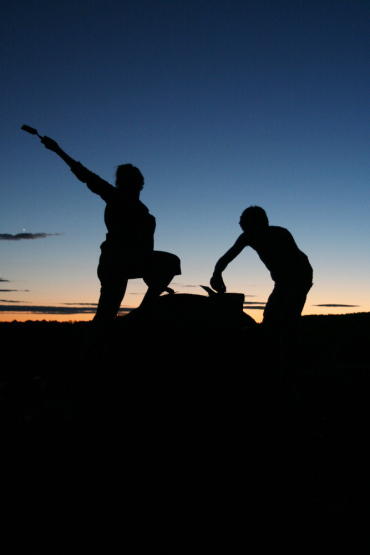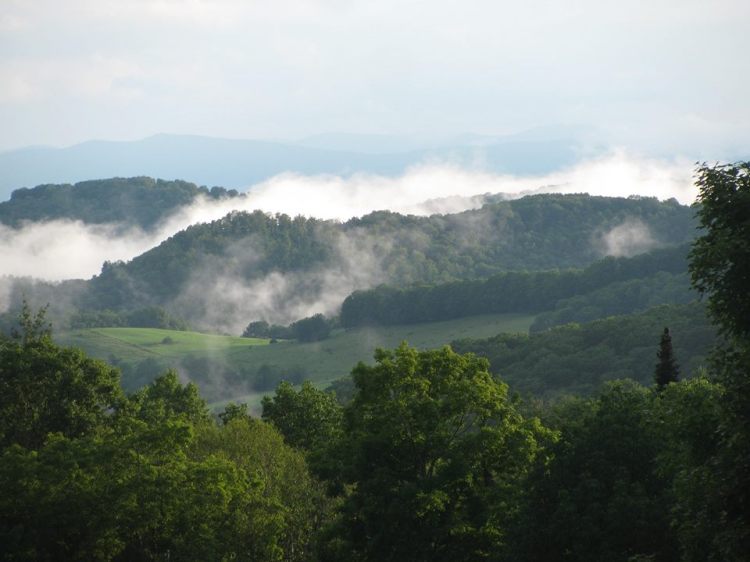It is a strange and contradictory summer.
Part of the time, you are entirely, freeingly unacademic. You bang down dirt roads in a rusted-out truck with no muffler and no inspection sticker, dust towering behind you. The windows are permanently rolled down, country radio permanently turned up. You help throw 300 haybales off a wagon and stack them in the barn, you set up sheep fencing, you learn how to drive the John Deere. Your father is building an outdoor oven in the garden behind the house, and you spend the last hour before dark with your little brother, balancing on top of the dome to apply the final layer of stucco. You both feel like giants, silhouetted against such a wide evening sky.
You work–six days a week as the vegetarian cook at a local farm and riding school. Up at 5:30 every morning, heat from three ovens on your face, to run a tight ship and bleach things and kill flies only when your Buddhist boss isn’t looking. You order quinoa in bulk and learn an astonishing number of ways to cook tofu. You play opera at all hours of the day, turned up as high as it will go, and make a few Cecilia Bartoli fans. You listen to talk radio, and try desperately to understand something of politics. And to your delight, you find a tiny community of intellectuals at this small Vermont farm. There is Jenn, the self-professed Feminazi, and Peter, the yogi, undergraduate degree from 70s Berkeley. You stand in the kitchen at six in the morning, pancakes burning behind you, and talk about psychoanalysis and gender roles and comparative religion with all of your might. It is a great gathering-in of perspectives, a time to ask a thousand questions you can’t ask anywhere else.
And you write. You live half in the future, on the other side of the grad school and Fulbright applications you agonize over. You want to be in Germany, you want to get out of mid-western American academia, you want to already have your PhD and be the teacher of some students at some college, somewhere. You draw up a sort of intellectual creed for your future self, wildly romantic. Pursue REAL scholarship, the most rigorous there is, not watered down or “friendly.” Never take the easy way out. Only the exhaustive is truly interesting. Engage DIRECTLY with real ideas, texts, thinkers, the most meaningful that exist–no hiding behind secondary literature, behind works that are technically interesting but say nothing about the human soul. Focus on the connections, the dialogue, between whole genres, epochs, minds. Look the hardest ideas in the face, actively pursue Truth. The ultimate goal of scholarship must be teaching, otherwise it becomes something monstrous. Shrink from specialization. Be charitable. Be humble, but not self-effacing. Turn outwards. Elegance, humanism, joy, admiration ALWAYS.
~~~~~~
You start to realize how much of an idealist you are–the world is always marvelous and beautiful, even when it is horrifying. Most people are genuine and wish you well, and you wish them well in return with all your heart. Scholarship and academia and philosophy are toweringly meaningful, lovely realms. You will revel in everything, even if you are rather solitary and overworked and sometimes terrified.
The windows are flying open again, and behind it all are the lyrics of a song from a pretty exceptional band, which you listen to almost as often as the Cecilia Bartoli.
Keep the earth below my feet
For all my sweat, my blood runs weak.
Let me learn from where I have been–
Keep my eyes to serve, my hands to learn
Keep my eyes to serve, my hands to learn.
___________
Photography, as always, from Anna.


